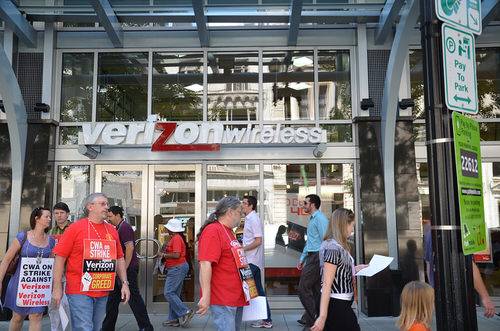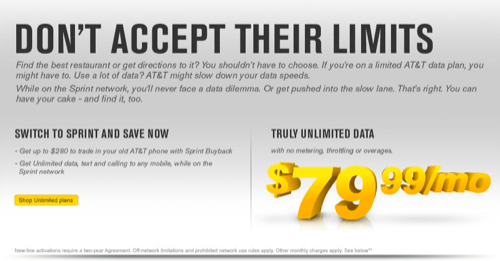
Verizon Wireless may be in the hot seat right now about its data-throttling plans, but it’s far from alone. In the United States, all four of the major cellular providers intentionally slow down data-hungry users, each in its own special way.
All that makes Verizon’s latest scheme—to throttle 4G LTE customers with unlimited data plans—seem like no big deal. But the Federal Communication Commission disagrees. Its chairman sent a pointed letter to the carrier about its proposed “network optimization” plan last week, demanding to know why only certain people are being targeted.
(Update, Friday August 8: The FCC is now investigating data throttling at all major carriers.)
Verizon CEO Daniel Mead defended his company’s actions to a group of reporters Monday in New York City, reports CNET, calling FCC Chairman Tom Wheeler’s letter “incorrect” and “surprising,” particularly since the commission hasn’t had any problem with similar policies from other cellular service providers.
It’s a polished and professional way of saying, Everyone else is doing it too, so what gives?
But All The Cool Kids Are Doing It
Verizon stated that, starting October 1, 2014, it will slow data connectivity for its heaviest 4G users when they hit overburdened cell sites. Not all users, though. Just those who still have unlimited plans.
FCC Chairman Wheeler, “deeply troubled” by this, wrote to the Verizon CEO on Wednesday, grilling him about the details of the plan and accusing the carrier of a blatant money-grab:
Reasonable network management concerns the technical management of your network; it is not a loophole designed to enhance your revenue streams. It is disturbing to me that Verizon Wireless would base its network management on distinctions among its customers’ data plans, rather than on network architecture or technology.
“We were very surprised to receive that letter,” Mead reportedly said in New York City. “There were many parts that were incorrect. We have great respect for the FCC, but I’m not sure the chairman understood what we’re doing exactly.”
Prior to issuing a separate formal response Friday (embedded below), Verizon posted a message on its site last Thursday, emphasizing that it would slow unlimited LTE users on “cell sites experiencing high demand,” not unilaterally debilitate devices. The idea, it said, is to preserve the integrity of the system for all of its users.
If the rationale looks familiar, that’s because it is: The other wireless operators use the same reasoning to justify their data-hobbling strategies too. And Mead pointed out that the competition also throttles their heaviest unlimited data users.
See also: Why Your Cellphone Bill Should Be Going Down—But Isn’t
Take AT&T, for example. Verizon’s biggest competitor has been crippling bandwidth “hogs” for years.
In 2010, AT&T became the first to phase out unlimited data plans for new users, replacing them with tiered plans that capped usage and charged for overages. Verizon quickly followed in 2011. Both cellular providers grudgingly allowed existing subscribers to hang onto their old unlimited plans.
But Verizon makes that difficult. Upgrading to a carrier-subsidized (discounted) handset is common practice in the U.S., but doing so on Verizon forces customers to choose a new plan with data caps. That’s not the case at AT&T. I can attest to the fact that upgrades don’t automatically jettison unlimited plans. I’ve upgraded several times, for both 3G and 4G devices, without losing my treasured plan.
Some clever customers figured out how to get around this problem at Verizon. They pay full retail price for their smartphones, or bring their own, and tie them to existing service. These customers can then use their data freely, without worrying about caps or limits. But under Verizon’s latest terms, if they become one of the top 5% of data users—using 4.7GB or more in a month—they could be sent trudging through the bandwidth equivalent of quicksand. Plus the terms, which previously affected 3G devices only, now cover 4G gadgets as well.
AT&T has long cut off its heaviest 3G and 4G unlimited users at the knees, whacking them down whenever they exceed 3GB (3G users) or 5GB (4G LTE users) per month.
The big takeaway seems to be that people with unlimited data plans who actually dare use them in an unlimited fashion will be punished. In other words, sip your data, don’t guzzle it down, lest Netflix trickle in and YouTube become a YouStraw.
It’s for the good of the whole network, after all. So sayeth the carriers, at least.
Working The Throttle
Some companies know how to work the throttle, and some don’t.
T-Mobile could offer a master class in how to make bandwidth restrictions seem like a great idea. The company practically made it a marketing ploy, spinning it as a helpful way to keep innocent users from getting slapped with evil overage charges.
Of course, now that it won’t count streaming music against data allotments, it gave back just enough to keep its cred as the cool person’s go-to cell provider.
Sprint offers a perfect counterbalance, but in all the wrong ways. Its throttling announcement in May casts it as a hypocrite, reversing every marketing message it has made in recent memory. The carrier has long lambasted the competition over its data caps and throttling. Now it needs to find a whole new campaign.

Crashing The C Block
While 4G networks may be more efficient than 3G, they don’t offer endless capacity. Even on LTE networks, there are limits to the amount of data they can handle. That’s a tough truth to face in today’s always-connected streaming, location-aware world.
See also: AT&T Has Invented A Way To Charge You Twice For The Same Internet
But Wheeler wondered, if this “network optimization” was supposed to reduce the load, why is Verizon throttling only its unlimited users? Subscribers with tiered data plans aren’t affected. This makes the wireless provider look like a money-grubbing company using sneaky tactics to annoy unlimited users, while preserving the ability to charge overage fees to others.
Even if that’s true, it’s still not alone. (Remember AT&T?) This is Verizon’s whole point.
Well, most of it.
The FCC’s letter also suggested Verizon might be violating the “700 MHz C Block” open platform rules it agreed to in 2008, when it bought more wireless spectrum at auction. The purchase gave the network more room to handle more traffic, but it had to agree not to “deny, limit, or restrict the ability of their customers to use the devices and applications of their choice.”
Of the four major carriers, only two—Verizon and AT&T—use the 700 MHZ frequency. Of those two, only Verizon promised to uphold that provision.
Verizon seems to have an answer for that too, according to the company’s official response to the FCC’s letter, obtained by CNET. It reports that Kathleen Grillo, senior vice president of the carrier’s regulatory affairs, found a technicality: “… neither the C block rules nor the Open Internet rules requires any particular minimum speeds, so long as providers are transparent with their customers.”
Your move, FCC.
Also, here’s Verizon’s formal response to the FCC’s letter:
Feature image by David Sim; Verizon image by AFGE

















